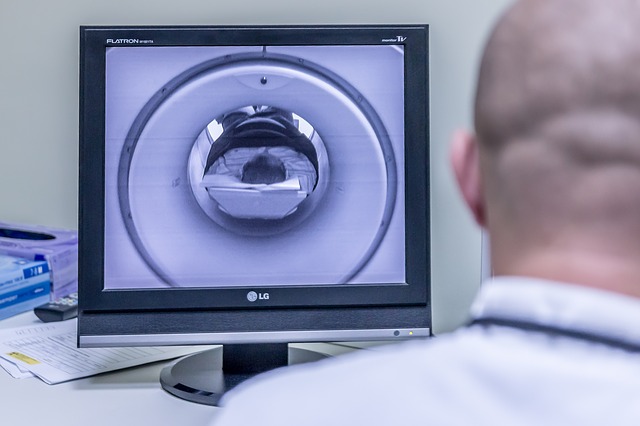A patented protein-targeted contrast dye for MRI has been developed by researchers for a safer, more sensitive, and non-invasive test for liver disease.
Chronic liver disease is recognized as a major cause of mortality worldwide, with reports suggesting that it accounts for about two million deaths per year. In the years from 2000 to 2015, the death rates resulting from chronic liver disease and cirrhosis in the United States increased by 31% amongst persons aged 45 to 65 years. Chronic liver disease can result from a number of causes including viral infections, metabolic diseases, autoimmune disorders, and alcohol abuse. Additionally, NASH or nonalcoholic steatohepatitis, which refers to the abnormal accumulation of fat in the liver is a leading cause of chronic liver disease affecting about eighty to a hundred million Americans.
Liver disease is a slow-progressing disease that does not necessarily result in symptoms in the early stages. However, if caught in the early stages, it is possible to stop the damage before it becomes life-threatening. The early stages of liver disease are marked by inflammation that progresses to fibrosis. Fibrosis is the scarring of the liver, which reduces the functioning capacity of the liver and if left untreated progresses to cirrhosis. Untreated cirrhosis results in the failing of liver functions as more and more scar tissue replaces the healthy tissue.
Early detection methods to catch liver disease at the inflammation or fibrosis stage is an urgent medical need. Biopsy of the damaged tissue is the gold standard of diagnosis and staging of liver disease. However, it is an invasive technique with inherent risks such as bleeding and infection. Several non-invasive methods of detection exist such as ultrasound, magnetic resonance elastography (MRE) that measures hardening of the liver, and magnetic resonance imaging (MRI). The magnetic resonance-based imaging techniques have several advantages like deeper tissue penetration and higher resolution; but, currently, these techniques are limited in their ability to detect the early stages of liver disease.
An advancement in MRI imaging techniques is the use of contrast agents that target specific proteins such as collagen, which is present at higher levels in damaged liver tissue. However, there are persisting issues regarding the specificity, sensitivity, and safety of these contrast agents. To address this urgent clinical need for safe and sensitive contrast agent to detect liver damage in its early stages, researchers from Georgia State University have developed the ProCA32.collagen1— a collagen-targeting contrast agent that binds tightly to the metal gadolinium commonly used in magnetic imaging methods—that enables detection of early and late-stage liver fibrosis. The researchers tested this agent in animal models and further verified the sensitivity of ProCA32.collagen1 using human tissue samples. As described by Dr. Yang, the lead researcher of the study, “It’s a revolutionary change for the field as the first robust detection of the early stage of liver fibrosis. This would help doctors monitor treatment before it is irreversible and help pharmaceutical companies to select the right patients for clinical trials or identify subjects for drug discovery.” The results of their study were recently published in the journal Nature Communications.
Tests in mice showed that ProCA32.collagen1 accumulated in high amounts specifically in early-stage fibrotic liver tissue and not in healthy liver tissue. The use of ProCA32.collagen1 also enabled the detection of early-stages of nonalcoholic fatty liver disease or NASH in the animal models. ProCA32.collagen1 can be used at a significantly lower dosage as compared to standard contrast agents, thus reducing the risk of toxicity. Its contrasting imaging enables differentiation between fibrotic regions and healthy tissue, which can mitigate the limitations of invasive biopsy techniques that cannot analyze the entire liver.
Dr Yang says, “Most people do not believe they have liver fibrosis and don’t want to change their lifestyle and we cannot detect it early. So, what happens is, they continue their lifestyle and at some point develop later-stage fibrosis which can become severe cirrhosis and a large portion become liver cancer.” Taking the research from animal models to clinical trials is the next step for Dr. Yang. The results from the current study show a lot of promise towards developing a sensitive and safe tool to aid in the early detection of liver disease.
Written by Bhavana Achary, Ph.D
References:
Data on prevalence of chronic liver disease – Asrani SK, Devarbhavi H, Eaton J, Kamath PS. Burden of liver diseases in the world. J Hepatol. 2019 Jan; 70(1):151-171.
Mani Salarian et. al., (2019). Early detection and staging of chronic liver diseases
with a protein MRI contrast agent. Nature Communications. 10:4777
Eurekalert Press release – https://www.eurekalert.org/pub_releases/2019-10/gsu-rlb102919.php
Image by Michal Jarmoluk from Pixabay



